Inside the world of the Workampers, who choose life on the road and piecemeal employment over conformity
They are radical downsizers, risk takers, irrepressible nomads. They roam the country in RVs and vans, alighting at RV parks, campsites and national parks long enough to take temporary gigs. They are called Workampers. Many are fleeing conformity and willing to exchange fixed addresses and material goods for a sense of freedom.
Amid the economic devastation of a pandemic-ravaged America, where secure jobs are increasingly scarce, it would not be surprising to find the Workamper lifestyle become one of necessity — as opposed to the lifestyle choice it has largely been.
Workampers are willing to toil for sustenance wages, becoming gate guards at Texas oil fields, hiring on at amusement parks, taking gigs at Amazon warehouses through its CamperForce program (Amazon chief executive Jeff Bezos owns The Washington Post). Sometimes their only compensation for work is a free site to park in, as well as hookups for water and electricity. “You got to park your ego at the door when you take some of these jobs,” says 68-year-old Bob Frechette, a former nursing home administrator.
Brenda Curtis knows that. The 56-year-old works at an RV park in housekeeping, which includes a lot of bathroom cleaning, instead of paying site rent. “I don’t make a lot of money,” she says, “but I don’t need a lot of money.”
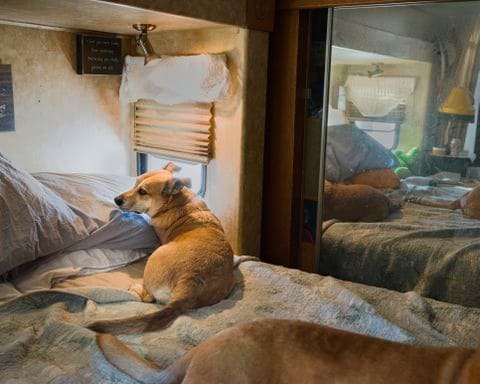 Margaret and Russell McNutt’s dogs Mac and Cammy relax on the bed in Arizona in 2018. (TIMOTHY EASTMAN/FTWP)
Margaret and Russell McNutt’s dogs Mac and Cammy relax on the bed in Arizona in 2018. (TIMOTHY EASTMAN/FTWP) Margaret and Russell McNutt’s dogs Mac and Cammy relax on the bed in Arizona in 2018.
It is not uncommon to find single female Workampers. “When I started traveling,” says Lysianne Evans, 62, a former small-business accountant, “a lot of women were like, ‘Jeez, aren’t you worried? Aren’t you scared to be traveling by yourself?’ I’m like, ‘No, that’s what my gun is for.’ ”
Like the hippies and train-hoppers of yore, this subculture shuns corporate or otherwise confining lifestyles. “One of the things about Workamping is that we’ll work less,” says 61-year-old Dale Greer, who had been in plastics manufacturing. “We want to be able to see things and take the time to do so. In today’s society it just seems like you’re always busy, you’re always working. You’re always rushing to get to one place, and everything’s like fast food, fast everything, fast information.”
Economically, the covid-19 pandemic has affected Workamping in ways that reflect the wider population. RV parks have closed. Jobs have been canceled. But those who have already spurned costly, debt-laden lifestyles may find it easier to adjust to greater privations.
It is, after all, a way of life by choice. As Allison Rogers, 69, put it: “My plans for the future are to do this until I can’t do it anymore.”
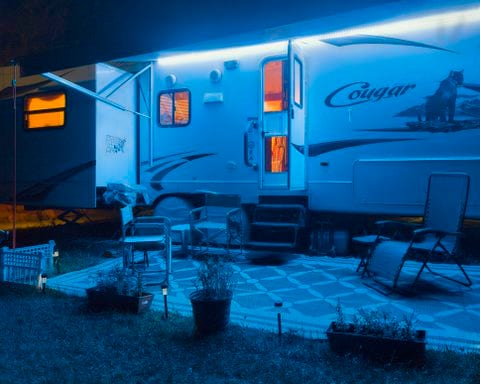 Carl and Marjie Simerson’s RV in New Hampshire in 2019. (TIMOTHY EASTMAN/FTWP)
Carl and Marjie Simerson’s RV in New Hampshire in 2019. (TIMOTHY EASTMAN/FTWP) Carl and Marjie Simerson’s RV in New Hampshire in 2019.
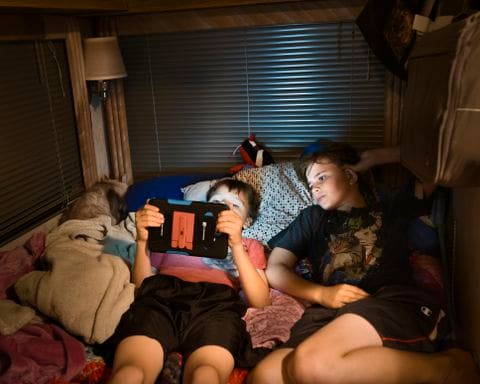 Rethan and Shaynen Edwards watch a video in the RV they share with their mother, Shannon. (TIMOTHY EASTMAN/FTWP)
Rethan and Shaynen Edwards watch a video in the RV they share with their mother, Shannon. (TIMOTHY EASTMAN/FTWP) Rethan and Shaynen Edwards watch a video in the RV they share with their mother, Shannon.
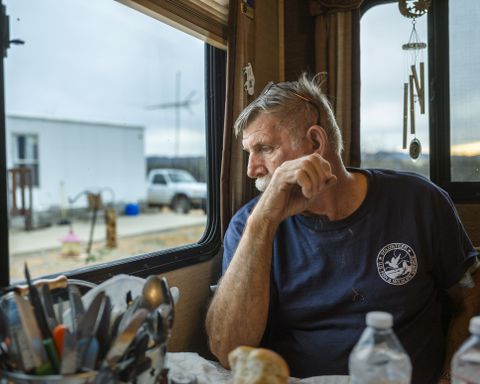 Henry Boruch looks out the window of the RV he shares with his wife, Louise, in Arizona in 2018. Louise Boruch says: “We have met all kinds of people in our travels that have stayed friends with us. We just meet awesome people. All walks of life from farmers to doctors, you name it.” (TIMOTHY EASTMAN/FTWP)
Henry Boruch looks out the window of the RV he shares with his wife, Louise, in Arizona in 2018. Louise Boruch says: “We have met all kinds of people in our travels that have stayed friends with us. We just meet awesome people. All walks of life from farmers to doctors, you name it.” (TIMOTHY EASTMAN/FTWP) Henry Boruch looks out the window of the RV he shares with his wife, Louise, in Arizona in 2018. Louise Boruch says: “We have met all kinds of people in our travels that have stayed friends with us. We just meet awesome people. All walks of life from farmers to doctors, you name it.”
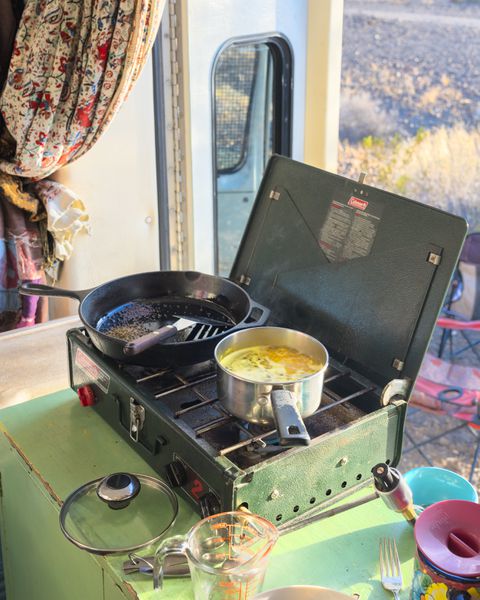 Food on a portable stove that Silvianne Delmars carries with her in her van in Arizona in 2018. (TIMOTHY EASTMAN/FTWP)
Food on a portable stove that Silvianne Delmars carries with her in her van in Arizona in 2018. (TIMOTHY EASTMAN/FTWP) Food on a portable stove that Silvianne Delmars carries with her in her van in Arizona in 2018.
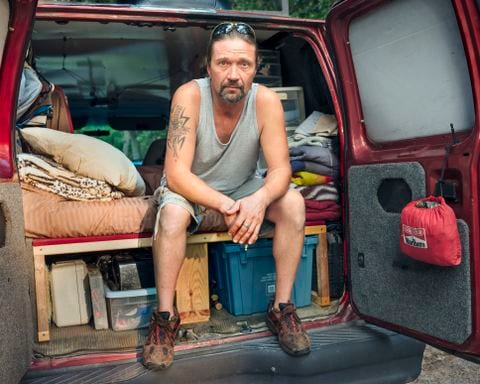 VALENTINE, NE – AUGUST 17, 2018: Kraig Luthe sits at the back of the van in which he lives and travels. (Timothy Eastman for The Washington Post)
VALENTINE, NE – AUGUST 17, 2018: Kraig Luthe sits at the back of the van in which he lives and travels. (Timothy Eastman for The Washington Post) Kraig Luthe in his van in Nebraska in 2018.
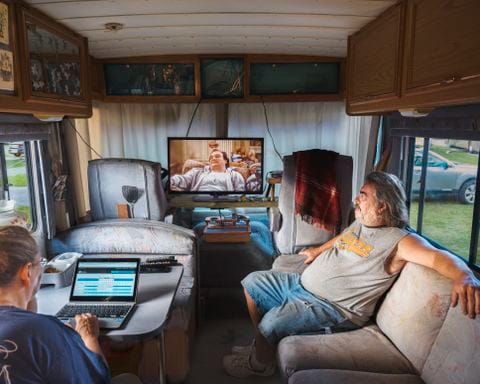 ALEXANDRIA BAY, NY – JULY 17, 2019: Scott Collins and Leslie Clark relax in the RV they share. (Timothy Eastman for The Washington Post)
ALEXANDRIA BAY, NY – JULY 17, 2019: Scott Collins and Leslie Clark relax in the RV they share. (Timothy Eastman for The Washington Post) Leslie Clark and Scott Collins relax in their RV in New York in 2019. “I miss the space of a house,” Clark says. “[But] I would trade that in any day for not having the stress and the weight on my shoulders of having to meet a rent payment or utility payment every month.”
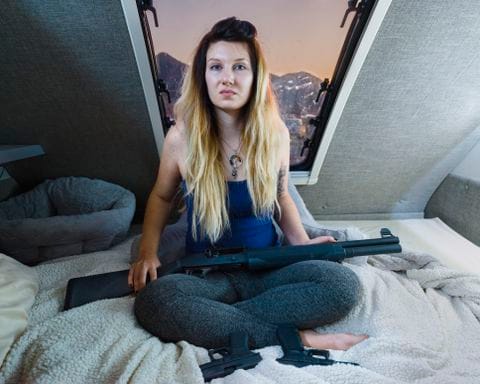 LAKE HAVASU CITY, AZ – FEBRUARY 9, 2019: Amanda Spangler displays the guns she travels with for self-protection. (Timothy Eastman for The Washington Post)
LAKE HAVASU CITY, AZ – FEBRUARY 9, 2019: Amanda Spangler displays the guns she travels with for self-protection. (Timothy Eastman for The Washington Post) Amanda Spangler, here in Arizona in 2019, travels with guns for protection.
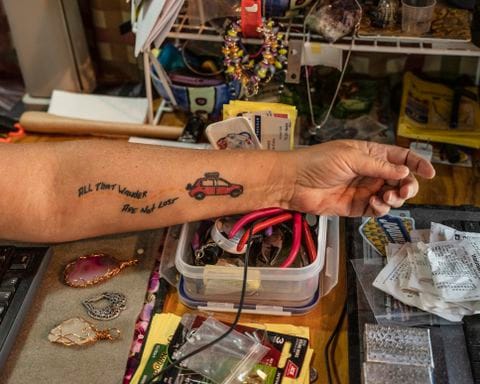 EHRENBERG, AZ – FEBRUARY 13, 2019: Lysianne Evans displays her tattoo which reads ÒAll that wander are not lost.Ó (Timothy Eastman for The Washington Post)
EHRENBERG, AZ – FEBRUARY 13, 2019: Lysianne Evans displays her tattoo which reads ÒAll that wander are not lost.Ó (Timothy Eastman for The Washington Post) Lysianne Evans in Arizona in 2019. Her tattoo reads “All that wander are not lost.”
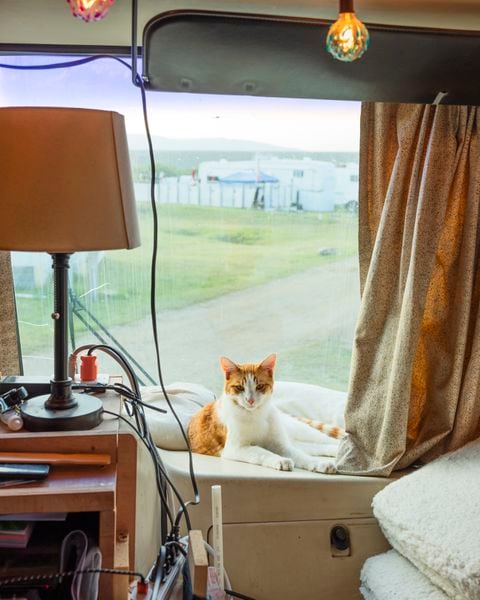 GUNNISON, CO – AUGUST 6, 2018: Kayte and Jon OÕDellÕs cat sits by the window. (Timothy Eastman for The Washington Post)
GUNNISON, CO – AUGUST 6, 2018: Kayte and Jon OÕDellÕs cat sits by the window. (Timothy Eastman for The Washington Post) Kayte and Jon O’Dell’s cat sits by a window in their vehicle in Colorado in 2018.
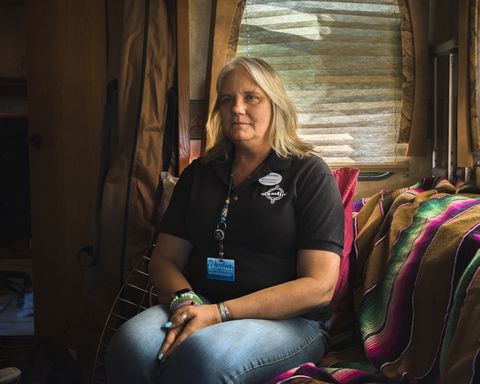 BENSON, AZ – MARCH 23, 2018: Margaret McNutt sits in the RV she shares with her husband Russell. (Timothy Eastman for The Washington Post)
BENSON, AZ – MARCH 23, 2018: Margaret McNutt sits in the RV she shares with her husband Russell. (Timothy Eastman for The Washington Post) Margaret McNutt, who shares an RV with her husband, Russell, in Arizona in 2018. Russell McNutt says: “Put into mind how much your electric bill is, your water bill, your waste bill, your cable bill, all of those cost-of-living bills. We don’t have any of that.”
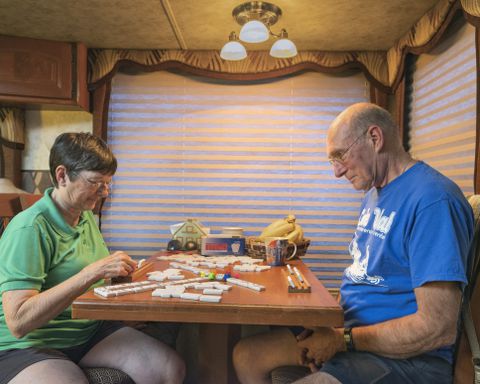 CONWAY, NH – JULY 25, 2019: Carl and Marjie Simerson play a board game inside their RV. (Timothy Eastman for The Washington Post)
CONWAY, NH – JULY 25, 2019: Carl and Marjie Simerson play a board game inside their RV. (Timothy Eastman for The Washington Post) Marjie and Carl Simerson play a game inside their RV.
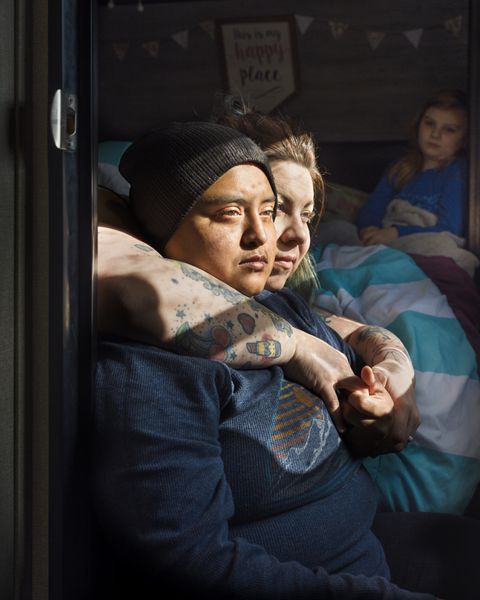 RISING SUN, IN – JANUARY 29, 2019: America Martinez, Shay Machen, and their son Oliver in the RV in which they live and travel. (Timothy Eastman for The Washington Post)
RISING SUN, IN – JANUARY 29, 2019: America Martinez, Shay Machen, and their son Oliver in the RV in which they live and travel. (Timothy Eastman for The Washington Post) Shay Machen, America Martinez and their son, Oliver, in their RV during a stop in Indiana in 2019. Before they began traveling and workamping, Machen says, “we were barely covering the bills, and we were just trying to live that nine-to-five life with the American Dream.”
Timothy Eastman is a photographer who lives in Brooklyn.
Photo editing by Dudley M. Brooks. Design by Michael Johnson.






